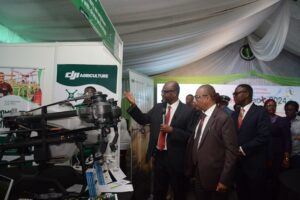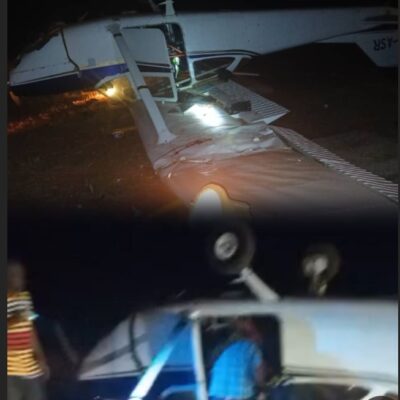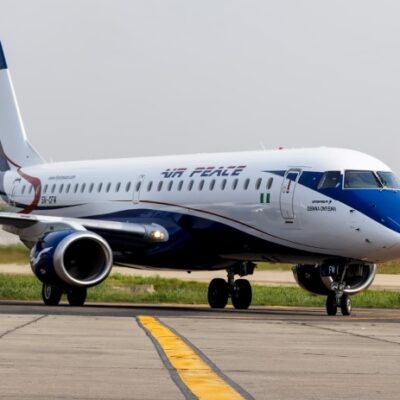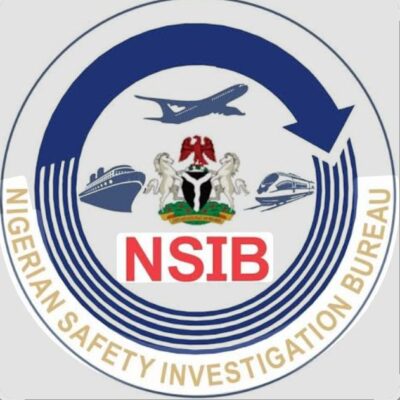
BY OLAPEJU OLUBI
In what may be described as a major milestone in innovation, the Permanent Secretary, Ministry Aviation and Aerospace Development, Dr Emmanuel Meribole, recently unveiled the Remotely Piloted Aircraft System (RPAS) Unit at the Nigeria Civil Aviation Authority (NCAA).
Already, over 300 applications have poured in from different operators who desire the certification to operate different types of Unmanned Aerial Vehicle (UAV) across Nigeria.
Dr. Meribole, while declaring open the UAS Unit in Lagos for the speedy registration of Drones, at the just concluded DRONTECX conference, called for a strong collaborations with key stakeholders and leveraging technology in order to achieve the vision of the Unit.
He assured of the ministry’s unflinching support to ensure the unit succeeds, just as he commended the vision of the Director General, Civil Aviation, Captain Chris Najomo in birthing the Unit.
Also speaking, the Assistant General Manager, Licensing and UAS representative to the International Civil Aviation Organisation (ICAO) Remotely Piloted Aircraft System (RPAS) Panel, Collette Onyeulo disclosed that the CAA is better positioned and well equipped now to address all the expectations of requests from different users who wish to obtain licenses for drone operations.
According to her, the unit needs to hit the ground running saying currently “we have over 300 applications for drone licenses. So it is a handful for us.”
She told the visiting Perm Sec that
“When you talk about collaborations, we are going to need them. Part of it is that what ICAO has come out with, drones are allowed to operate in three categories. One is the open category, this category is where we have the big question mark because that is where you have the hobbies and recreational use of the drone and the NCAA don’t currently have any regulation covering that.”
However Collette said “what we are afraid of is the small drones that could be used to create mayhem, so our appeal today sir is that we need support, support in the sense that the CAA through the unit is equipped to come up with a robust regulation. One of the ways we have brought this out is that a portal, just as it is done in other climes, can be created.”
“We appeal that inspectors drawn from different departments be trained and retrained on this because this is not what we know; Even ICAO is still starting and learning on this. So we have presented that when we have a portal just as it is done in the US, the FAA, for recreational drones, the paperwork would be overwhelming.
“We desire to set up a user friendly portal so that every information we need about you, you provide, and then there is that interface with NSA because the NSA has always been there because of the security implications of the drone and has also given a cap that we cannot go beyond 25 kg, we say that is fine that is okay.”
“Once we get everything we need to know about anyone who made a request on the portal, we will assign a unit ID to that person.
With that ID whether you are operating from Taraba, we know we already have all your data and on that same portal we can now create simple rules of the air that a layman can understand, even if we need to present them in our local languages they can be done. It will also help the customs in its clearance procedures and simplify the drone acquisition and its user procedure because the portal will act as a one stop shop location.”
She added “Sir, these need both resources, they need time, energy and overwhelming support so sir we are glad that we have the father of the house that will take this matter for us, we already have the support of the CAA under the able leadership of the DG that is helping us to make headway.”
“So training and retraining is key for the unit. We intend to collaborate with the training school and with some of the ROC holders to start up an incubation training school, we need to designate and localize these things. But firstly let the inspectors and those in the unit be trained.”
“It will also be good for them to do an On the Job Training because they need to know how it is done in the US, in Kenya, South Africa and other countries because we have read a lot about the practices in other countries, and we have joined webinar classes. We need to have hands- on experience, and then a robust framework like the organiser of the Dronetect is very critical.”
Olapeju is a journalist and aviation reporter.




